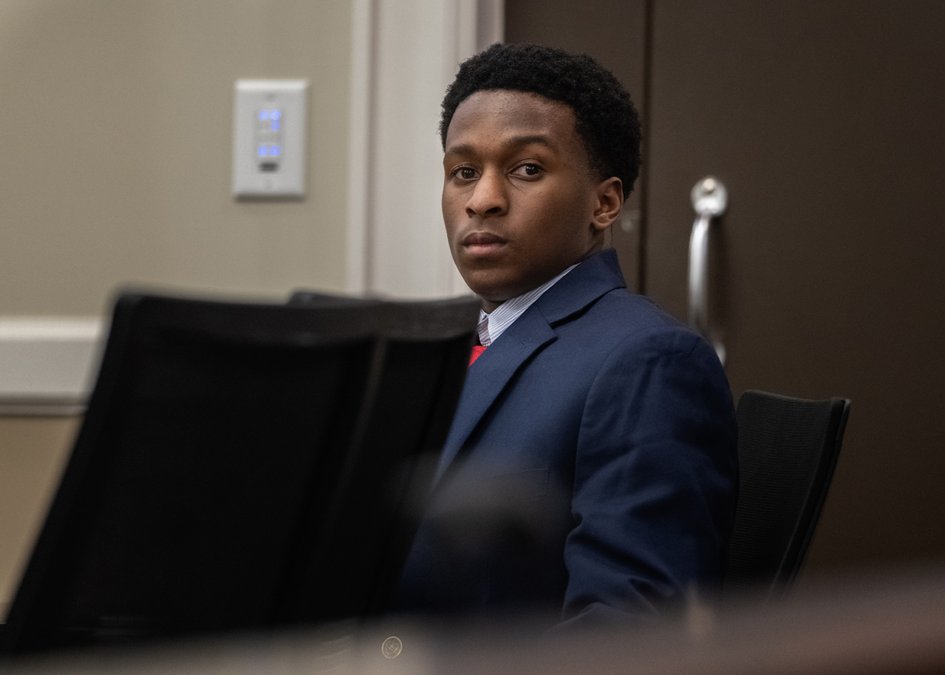After a week of trial in the Superior Court of Forsyth County and nearly a day of deliberation, a jury has not yet reached a verdict in the case of State of Georgia v. Re’Deyon Hughes.
Hughes, 16, of Roswell, stands accused of shooting and killing local 18-year-old Drelandon Brown, as Hughes fled the Brown residence off Wondering Way in south Forsyth on Nov. 23, 2017.
Through the trial, members of the jury heard testimony from eyewitnesses at the scene, law enforcement officers, crime scene experts and the defendant himself, as the prosecutors laid out a case for charges of malice murder, felony murder and aggravated assault, while Hughes’ defense attorneys stated that the killing was justified by self-defense.
In her closing arguments, prosecutor Heather Dunn spent significant time laying out the basis for malice murder and felony murder case, pointing out the facts that Hughes came to the house with a loaded firearm, using it both to threaten the Brown brothers and to kill Drelandon Brown.
Dunn also reinforced her argument that the shooting could not have been self-defense, walking the jury through the factors that determine self-defense.
“When it comes to this defendant, he does whatever he wants and on Nov. 23, 2017, he did it where ever he wanted,” Dunn said. “Particularly in a household where he was absolutely not welcomed and expressly forbidden to be, so he could be with a girl he was expressly forbidden to be with.”
Dunn also reinforced her argument that the shooting could not have been self-defense, walking the jury through the factors that determine self-defense.
Dunn stated that the use of force is only justified if the threat against them would “excite the fears of a reasonable person,” and is not justified if excessive force is used, if the fear or threat is provoked by the defendant, if the defendant is the initial aggressor in the situation, or if the use of force is retaliatory for past wrongs.
After thanking the jury for its service, attorney Evan Watson began his closing arguments by bringing a canvas and easel before the jury, displaying a blown-up photo of Re’Deyon Hughes, Marjorie Brown and their child, Major, on the night of Nov. 23, 2019, its caption reading “with my beautiful new family for the first time on Thanksgiving. Happy Thanksgiving for all.”

“Did Ray intend to go over there and get some sort of revenge? Did he intend to start up controversy? No. Did he intend to have two men standing at a door, threatening to bust it down? ... No,” Watson said. “The state doesn’t have one piece of evidence to suggest that he went there looking for any sort of trouble.”
Watson made the case that his client was scared for his life, based on past alleged run-ins with the brothers and the way that they allegedly “pounded on the door to the bedroom” where Hughes hid before the shooting.
“Ray Hughes had no way of knowing that evening what those brothers were coming into that room armed with or otherwise,” he said.
He also theorized that Brown’s younger brother, Jaymareion Brown, had time between the shooting and when deputies arrived to “cover up the situation,” stating that another firearm was found “a couple of yards away in a closet.”
Later, in the second part of her closing, Dunn lambasted the possibility of a cover-up by the Brown family, playing an eight-minute clip of the 911 call Jaymareion Brown made after the shooting while he attempted CPR on his brother and his family sobbed audibly into the phone.
“I submit to you that there is absolutely not only no evidence, but it is ridiculous to believe that prior to making this 911 call he is running around that house, breaking a gun, hiding a gun and coming up with this concoction of a plan,” Dunn said. “That is the most ridiculous thing I have heard in a while as a prosecutor.”
After about three hours of deliberation in the case, the jury returned to the courtroom with two hypothetical situations that question whether Hughes could be convicted of aggravated assault without being convicted or murder.
Superior Court Judge David L. Dickinson answered the jury by stating that each charge in the case must be considered separately based on the evidence presented at trial.
At the end of the day Friday, Dickinson adjourned the court until Monday morning.
If convicted on either of the murder charges, Hughes could face a life sentence without parole, according to Georgia law.

